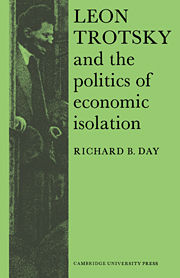Book contents
- Frontmatter
- Contents
- Preface
- Part one THE DILEMMA OF ECONOMIC ISOLATION
- Part two THE POLITICS OF ECONOMIC ISOLATION
- 4 The search for a new faith
- 5 Socialism in One Country
- 6 Trotsky's alternative
- 7 Trotsky's attack on socialism in a ‘separate’ country
- 8 Integrationism in defeat and exile
- Bibliography
- Notes
- Index
- CENTRE FOR RUSSIAN AND EAST EUROPEAN STUDIES UNIVERSITY OF TORONTO
4 - The search for a new faith
Published online by Cambridge University Press: 25 October 2009
- Frontmatter
- Contents
- Preface
- Part one THE DILEMMA OF ECONOMIC ISOLATION
- Part two THE POLITICS OF ECONOMIC ISOLATION
- 4 The search for a new faith
- 5 Socialism in One Country
- 6 Trotsky's alternative
- 7 Trotsky's attack on socialism in a ‘separate’ country
- 8 Integrationism in defeat and exile
- Bibliography
- Notes
- Index
- CENTRE FOR RUSSIAN AND EAST EUROPEAN STUDIES UNIVERSITY OF TORONTO
Summary
The first three chapters of this book have examined the isolationism of War Communism and the integrationism of the early NEP. These two international outlooks, together with their corresponding systems of policies, provided the economic background for more than half a decade of ensuing political conflict. Although a number of excellent works have been devoted to the political history of the 1920s none have analyzed the material in terms of this economic dichotomy. For that reason none have managed to explain satisfactorily either the origins or the meaning of Trotsky's conflict with Stalin. The justification for interpreting political events in these terms is readily at hand in the Bolsheviks' own belief that ‘politics is concentrated economies’. Perhaps the famous dictum would have been more accurate if reversed; that is, if economics had been described as concentrated politics. But the fact remains that the intimate connection between the two spheres of action was never more evident than in the years 1922–8.
The party's age of innocence ended in the spring of 1922. Shortly thereafter Lenin's terminal illness initiated a vicious and protracted contest among his potential successors for total political power. Economic policy emerged almost immediately as one of the main issues in dispute. Lenin had led his followers into the wilderness only to die before he could lead them out. The road to socialism had still to be defined. Confusion bred the desire first for certainty and ultimately for a faith supplemented by force.
- Type
- Chapter
- Information
- Leon Trotsky and the Politics of Economic Isolation , pp. 69 - 104Publisher: Cambridge University PressPrint publication year: 1973



